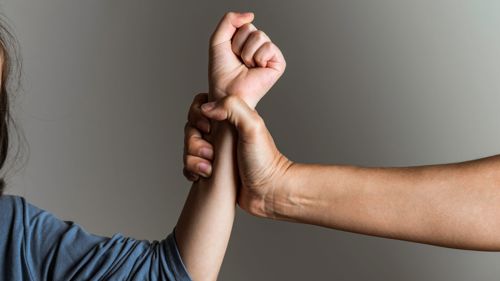Domestic Abuse
In this country, the Definition of Domestic abuse is 'Any incident or pattern of incidents of controlling, coercive, threatening behaviour, violence or abuse between those aged 16 or over who are, or have been, intimate partners or family members regardless of gender or sexuality'
Disagreements in relationships and family life can be normal but when they become frequent and begin to form a pattern, it might be a sign that something is wrong, and possibly abusive. If something doesn’t feel right, it probably isn’t.
Domestic abuse is a crime. It is never the fault of the person who is experiencing it. Anyone can be a victim — regardless of age, background, gender identity, sex, religion, sexual orientation or ethnicity.
Domestic abuse can include the following:
· Physical abuse – a visible sign of abuse this can include anything that causes you or your environment harm, for example punching, holding you down, pulling your hair out, or punching walls / breaking things.
· Psychological and emotional abuse – when words or nonphysical actions are used to manipulate, hurt, scare or upset you, for example shouting or mocking you, making you doubt your sanity (gaslighting), making threats, telling you they are sorry and this is not abuse.
· Coercive control – for example isolating you from others, depriving you of basic needs, controlling your time.
· Financial and economic abuse – controlling and threatening behaviours relating to money, for example controlling all income, using cards or building debts in your name, controlling or monitoring your spending. This can be linked to how rent is paid and withholding benefits.
· Sexual abuse – for example sexual activity without your consent, which can include where you have consented under pressure or because you are afraid, using force manipulation or intimidation.
· Tech abuse – using smart home devices to monitor and control, for example accessing your phone / social media, access to online banking, sharing intimate photos online, using cameras to watch or listen.
· Honour-based abuse – when a crime is committed to protect or defend the ‘honour’ of a family or community, for example forced marriage or adoption, restrictions on freedom, isolation.
· Female genital mutilation (FGM)
· Disability abuse – for example withholding, hiding or destroying medical equipment that you rely on, prevention of access to medication, changing your medication without your knowledge.

How to access support
You can access information and guidance on the gov.uk website: https://www.nhs.uk/live-well/getting-help-for-domestic-violence/
There are also several charities offering specialist support:
· Women's Aid or Refuge for women
· Men's Advice Line for men
· Galop for LGBT+
Bright Sky is also available in an App and can provide support and guidance and is accessible in multiple languages.
Helping someone you know
If you're worried a friend is being abused, let them know you've noticed something is wrong. They might not be ready to talk but try to find quiet times when they can talk if they choose to. If someone confides in you that they're suffering domestic abuse listen to them, give them time to talk but do not push them if they do not want to. Reassure them that nobody deserves to be abused, no matter what the abuser tells them. Help them to access support, access medical care, and report the assault to the police if they wish to.
How Housing Solutions can help
We will support residents experiencing abuse and empower them to make their own decisions and make informed choices.
We will:
· Make contact within one working day of a concern being reported to us.
· With consent, complete a risk assessment with the resident.
· Work with the resident to agree how we will investigate their case and an action plan.
· Signpost to the right support.
· Agree how often we can stay in touch and agree a safe place to meet.
· Where it is practicable for the resident to remain in their home, every effort will be made to provide additional security.
· Work with the local authority to source temporary accommodation if necessary.
If you have concerns about yourself, or someone you know. You can contact us through the methods below for confidential advice and signposting if required.
· By phone 01628 543101
· By email to Communitysafety@housingsolutions.co.uk


